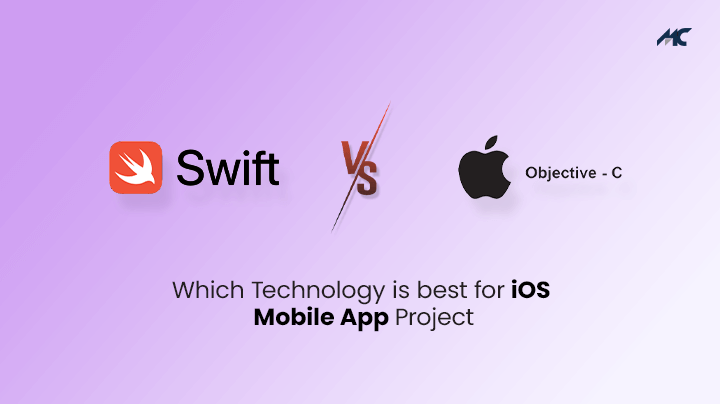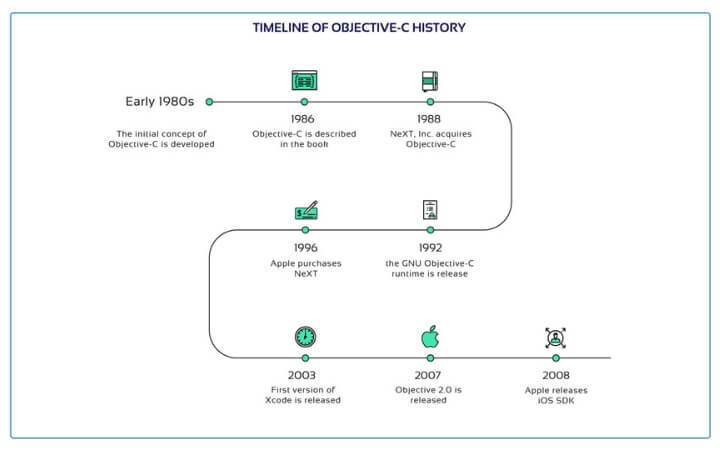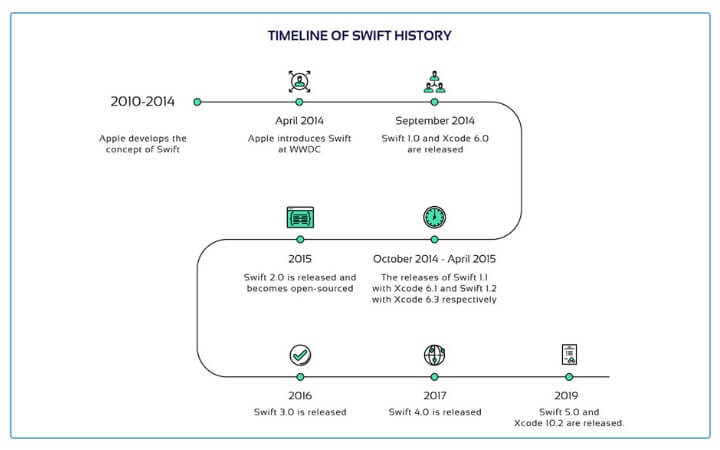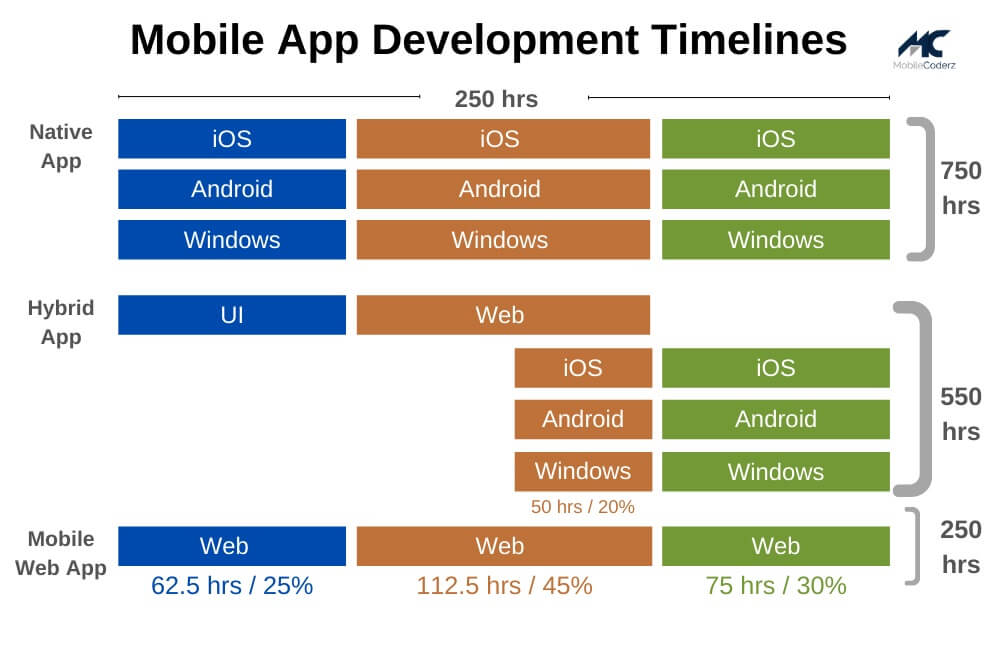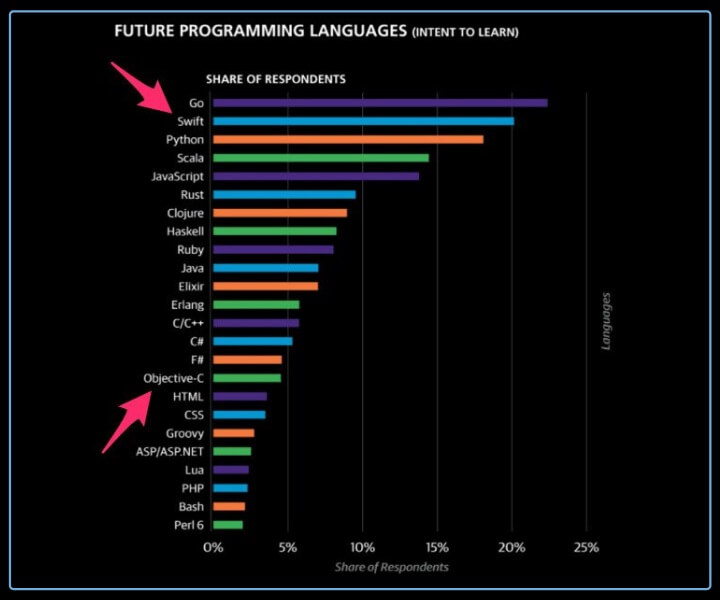If you are a business owner then you want to develop an amazing site and app. The first thing you must do is to freeze on the best programming language. No doubt! iPhone app development is one of the imminent spheres of mobile application development.
Brief Introduction – Swift Vs Objective-C
Now to develop iOS apps, two powerful languages (Swift and Objective-C) are contending against one other. These two prominent languages are the leading players.
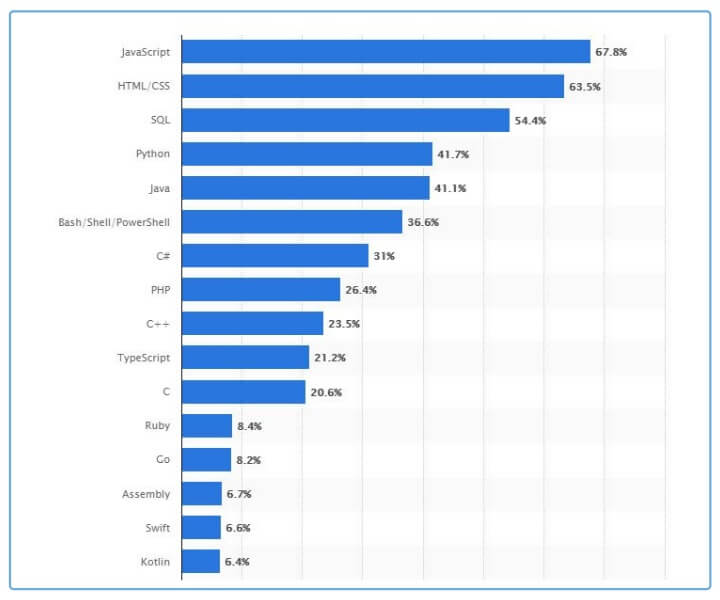
Developing the codes in Objective-C is not exactly that breeze. Furthermore, the syntax is not user-friendly too. Thanks to Apple. They introduced Swift in 2014. As per the Stack Overflow Survey, almost 77..6% of professionals opt for Swift over Objective-C.
However, these languages are the top-paying technology skill in the United States.
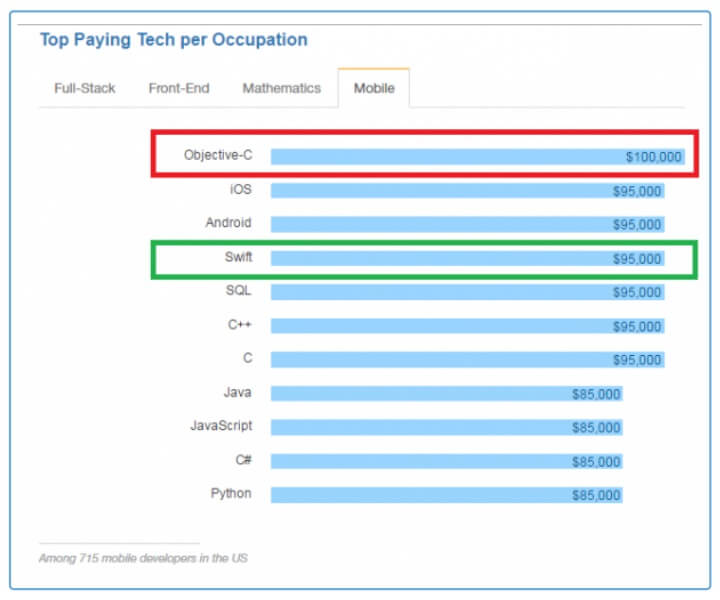
Chronicles of Swift and Objective-C
- The initial and the utmost disparity betwixt the two is the age.
- Both of these programming languages were launched for general purposes. But their approaches for their programming differ.
- These two languages are not only flexible but also versatile for iPhone app development.
a. Chronology of Objective-C
- It is almost 35 years old.
- This prolonged time allowed us to gather an essential knowledge base and engage numerous communities.
b. Chronology of Swift
- This language is comparatively new in comparison to Objective-C.
- It is not only powerful but also a modern language for future and current platforms and devices of Apple.
2. Pros and Cons of Swift and Objective-C
A. Objective-C
Pros of Objective-C
- Maturity: This language has been embraced by developers for more than 30 years (as mentioned earlier). Hence, this is a mature and advanced language. Adding, it is tested well and has an extensive open-source library. You can also enjoy clear documentation.
- Vital typing: It can help to simplify the codes.
- Compatibility: Being in the world for a longer time, it can easily support the older version of macOS and iOS.
Stable: This is a stable language and does not need frequent updates. Hence, one must give a second thought about migration to different versions.
2. Cons of Objective-C
- Difficult to learn: It is not at all easy to learn. It is based upon the principle of OOP. Moreover, it has complex syntax.
- Limited features: It is not embedded with modern features.
B. Swift
Pros of Swift
- Easier: It is easy to learn and use. You do not have to wait for a prolonged time for the process of development. This language is very concise as well as clear.
- Modern features: Since it is new, it will have all the modern Swift features. It includes dynamic libraries, excellent monetization of apps, etc.
- Easy development: You can develop with fewer codes. So, it saves plenty of time.
2. Cons of Swift
- Versions: You will encounter frequent updates. Thus, there is a requirement for migration to the new version. It can lead to money as well as time loss.
- Compatibility: It does not support the former versions prior to macOS 10.9 and iOS 7.0.
3. Comparison between Swift and Objective-C
a. Environment for development
This is exactly the place where you can encase your magic wand.
If you employ Objective-C to build OS X or iOS apps, you can utilize Xcode IDE. You can also opt for Visual Studio Code or App Code from Microsoft. Whatever the situation, but they work accurately beneath X code.
Xcode offers you the best kits for the progress of software. For iOS app development, it will give everything virtually. Now, this will include the APIs, frameworks, and compilers. Adding to it, there are pre-built numerous elements. This you can utilize to develop a functional app.
Cocoa is fused with Xcode. Contrary to this, Cocoa Touch assists to develop apps for Apple’s product in Swift. Now, these products include Apple watched and Television.
You can learn the coding by utilizing Swift Playgrounds in Swift. You can also further use this for testing the small parts of the code. So, now you do not have to compile all the codes.
Hence, when you are ready with your ideas you can instantly check. All you have to do is develop proper codes in Playgrounds.
Using Swift, one can simply operate in an alike environment as Objective-C. But you must have direct access to recent advancements. This will expand the possibilities.
Read: Top Hybrid Mobile App Development Frameworks
b. Speed in Coding
The speed to develop the code influences the overall costing of app development. Even though both these languages are native to iPhone, they are not similar.
Swift is one of the contemporary languages that is earning its prominence in the market. This language is purely easy to handle. One can quickly adapt to this language instantly.
You will have to develop only 30% of code lines in comparison to Objective-C. One can avoid glitches while developing. It is good news for business owners as you can do cheaper and quick testing.
c. Documentation
You cannot overestimate the significance of this feature. The more you know about these tools and languages, the more you can avoid mistakes.
Both these languages have wide documentation!!
You can easily navigate the documentation of Objective-C in the archives of Apple. Conversely, Swift’s documentation is regularly updated. You can easily find updated sources. Swift is open-source, you can search for ample third-party support of the sources. You can also easily find a repository of GitHub for Swift language.
d. Size of the project
Does the size of the project really matter? Well, when we talk in terms of the programming language. It really matters!!
If you have smaller projects on iOS, then you can go for whichever program you desire. It offers complete and favorable options to make the changes.
It is not generally recommended to use Swift for larger projects. The main reason is changing versions is time-consuming and tedious.
You will have to spend hours changing to advanced syntaxes. You have to do it for minor updates too. This may lead to broken builds. It can last for days, probably to weeks as per the size of the project.
Do you want this?
Well certainly, your answer will be “NO”. So, don’t punish yourself and end up in a situation that can lay back behind the schedules.
e. Timeline
How long does it take to develop a functional iOS app?
It will purely depend upon your requirement.
One of the elementary things that you as a business owner must keep in close check is to have a timeline date. You must have a detailed talk with the developer you have hired about the same.
If you have a tight deadline then it is better that you opt for Swift.
It will assist you to quickly move. But as mentioned earlier, there might be hurdles because of new versions and releases. If you can hold on and slowly progress then Objective-C is the best choice for you.
Learn More: Top 10 IOS App Development Language & Tools 2021
f. Future-proofing, APIs, and C++
Objective-C is an excellent choice if you have plans to develop an app using the foundations APIs. It includes the following:-
- CoreAnimation
- CoreFoundation
- AVFoundation
* Nevertheless, Swift has smoother wrappers and memory management.
* C APIs and C-based functions, both work well with Objective-C.
* With that said, Swift is an excellent choice for future projects. There are a plethora of open-source possessions accessible for Cocoa projects. These projects are linked to Swift.
Just take a look at the image below to check the ranking of the Swift
Go for the right partners to develop iOS apps
iOS provides an incredible potential client base for organizations. So it is fundamental that your application establishes its way to the App store.
Notwithstanding, Apple has introduced the process of rigorous review for their app. This is the reason why many apps are getting rejected due to their shoddy designs and coding.
Do you want your app to get rejected?
If not, it is better that you hire an iOS app development company. Ensure they are employed with the best in-house talents. They are trained well so that they are up-to-the-date with the latest tools and advancements. They will keenly follow the recommendations and guidelines raised by Apple.
So, going back to the question!!
Swift Vs Objective-C: Which one is the best Mobile App Project?
This you have to figure out yourself.
Objective-C is one of the classical languages used in programming. It is currently more prominent. It is quite tough to learn, but there are plenty of mobile app developers in the market who have extensive years of experience in using it.
In comparison, Swift is a newborn baby. But it is making the progress quicker. It is perceived as the best and safest option in comparison to Objective-C. It is very quick to learn. It is not all a good choice for larger projects.
It is the circumstances, the familiarity with the language, the timeline, and the size that can help you to choose the best.
Make sure that you weigh all the essential elements. It must include the pros and cons, APIs, runtime, stability, and tool support. These features can give you proper guidance for your next iOS project.
